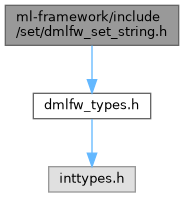Core unordered string set types and utilities. More...
#include <dmlfw_types.h>

Go to the source code of this file.
| typedef struct __dmlfw_set_string | dmlfw_set_string |
| Opaque structure representing an unordered set of unique strings. | |
| int | dmlfw_set_string_add (dmlfw_set_string *set, char *string) |
| Adds a unique string to the set. | |
| dmlfw_set_string * | dmlfw_set_string_create_new (void) |
| Creates an empty unordered set of strings. | |
| void | dmlfw_set_string_destroy (dmlfw_set_string *set) |
| Destroys the string set, freeing all resources. | |
| void | dmlfw_set_string_get (dmlfw_set_string *set, index_t i, char **string) |
| Retrieves a copy of the string at the given index. | |
| dimension_t | dmlfw_set_string_get_size (dmlfw_set_string *set) |
| Retrieves the number of unique strings in the set. | |
Detailed Description
Core unordered string set types and utilities.
- Version
- 1.0
- Date
- 2025-09-25
This header defines opaque unordered set structures specialized for string data. It provides APIs for creation, destruction, element access, adding unique strings, and querying the set size.
Error Handling:
All functions report errors via the centralized error API. Use dmlfw_error() to check for errors after calls. dmlfw_get_error_string() and dmlfw_get_debug_string() provide diagnostic details.
Ownership:
Functions returning new set pointers transfer ownership to the caller, who is responsible for freeing with dmlfw_set_string_destroy(). Returned strings from get operations are allocated and must be freed by callers.
Typedef Documentation
◆ dmlfw_set_string
| typedef struct __dmlfw_set_string dmlfw_set_string |
Opaque structure representing an unordered set of unique strings.
The internal details are encapsulated. Use provided API functions for creation, manipulation, and destruction.
Function Documentation
◆ dmlfw_set_string_add()
| int dmlfw_set_string_add | ( | dmlfw_set_string * | set, |
| char * | string | ||
| ) |
Adds a unique string to the set.
- Parameters
-
set [in] Set (must not be NULL). string [in] String to add (must not be NULL).
- Returns
- -1 on memory failure, 0 if string was added or already exists.
Usage example:
- Examples
- example_set_string.c.
◆ dmlfw_set_string_create_new()
| dmlfw_set_string * dmlfw_set_string_create_new | ( | void | ) |
Creates an empty unordered set of strings.
- Returns
- Pointer to newly created set or NULL if allocation failed.
Usage example:
- Examples
- example_set_string.c.
◆ dmlfw_set_string_destroy()
| void dmlfw_set_string_destroy | ( | dmlfw_set_string * | set | ) |
Destroys the string set, freeing all resources.
- Parameters
-
set [in] Pointer to set or NULL (no-op).
Usage example:
- Examples
- example_set_string.c.
◆ dmlfw_set_string_get()
| void dmlfw_set_string_get | ( | dmlfw_set_string * | set, |
| index_t | i, | ||
| char ** | string | ||
| ) |
Retrieves a copy of the string at the given index.
- Parameters
-
set [in] Set (must not be NULL). i [in] Zero-based index. string [out] Pointer to receive newly allocated string.
- Note
- Caller must free the allocated string.
- On error sets error status and string is NULL.
Usage example:
- Examples
- example_set_string.c.
◆ dmlfw_set_string_get_size()
| dimension_t dmlfw_set_string_get_size | ( | dmlfw_set_string * | set | ) |
Retrieves the number of unique strings in the set.
- Parameters
-
set [in] Set (may be NULL).
- Returns
- Number of elements or 0 if NULL or error.
Usage example:
- Examples
- example_set_string.c.